Unit 2 English around the world Warming up
文档属性
| 名称 | Unit 2 English around the world Warming up | 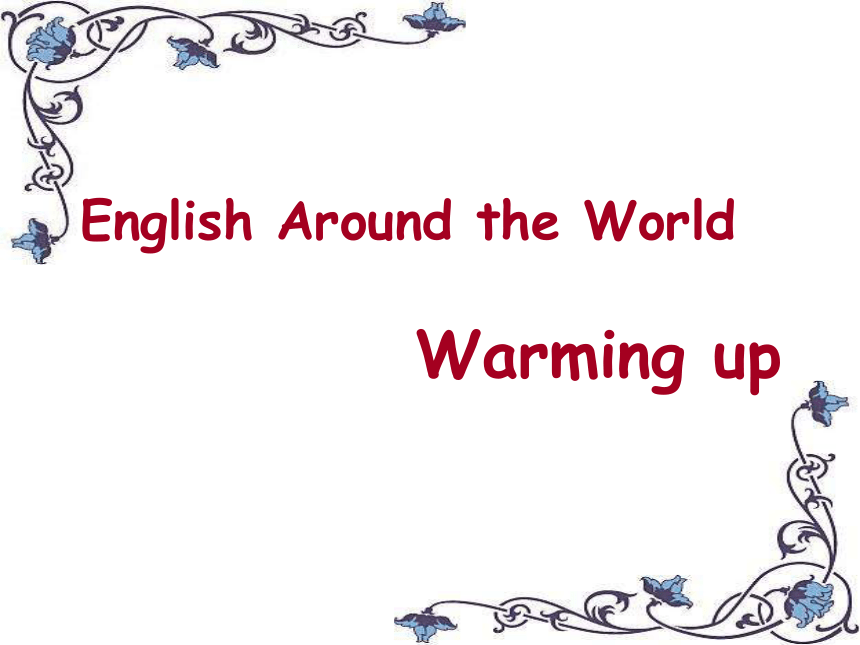 | |
| 格式 | rar | ||
| 文件大小 | 2.0MB | ||
| 资源类型 | 教案 | ||
| 版本资源 | 人教版(新课程标准) | ||
| 科目 | 英语 | ||
| 更新时间 | 2009-09-24 18:17:00 | ||
图片预览

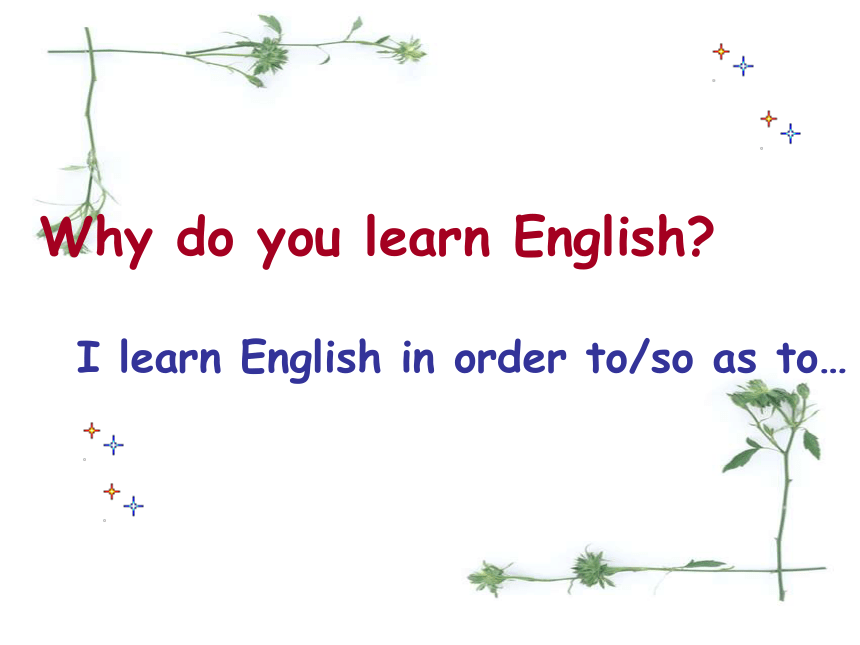
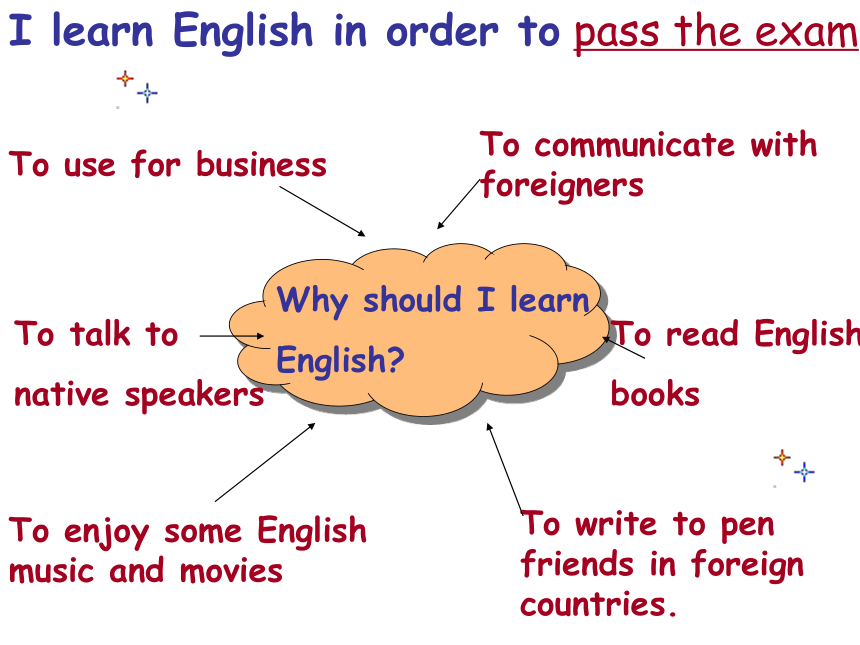
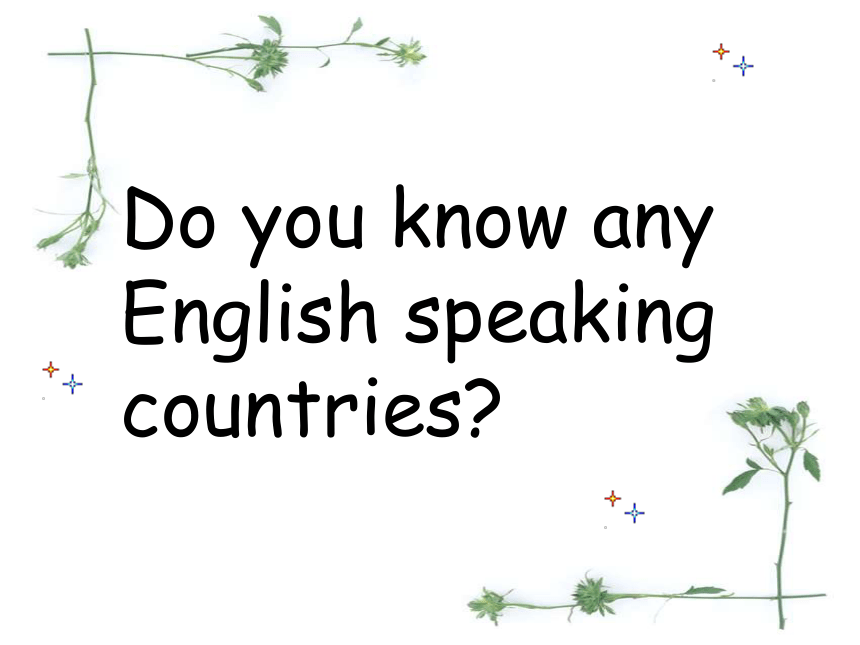
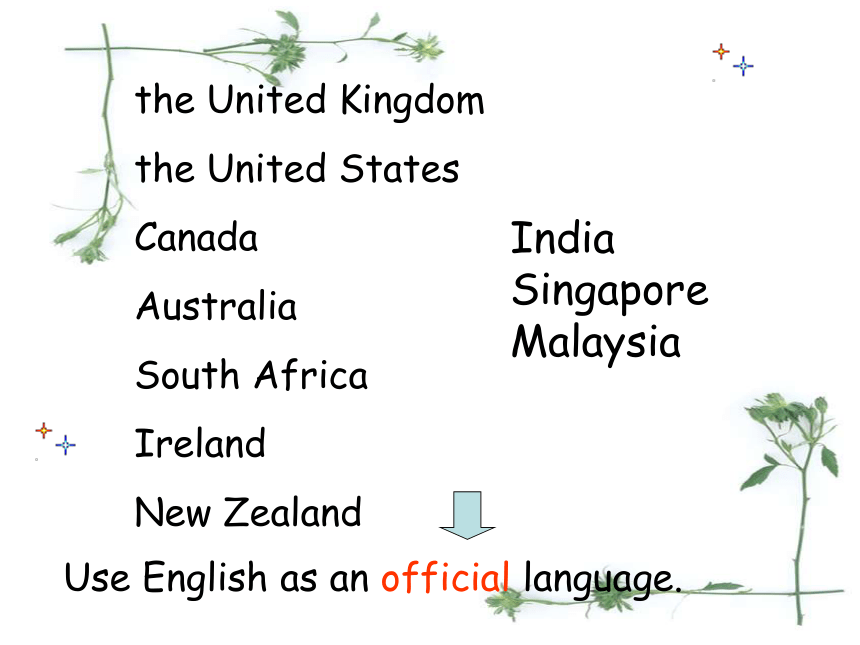
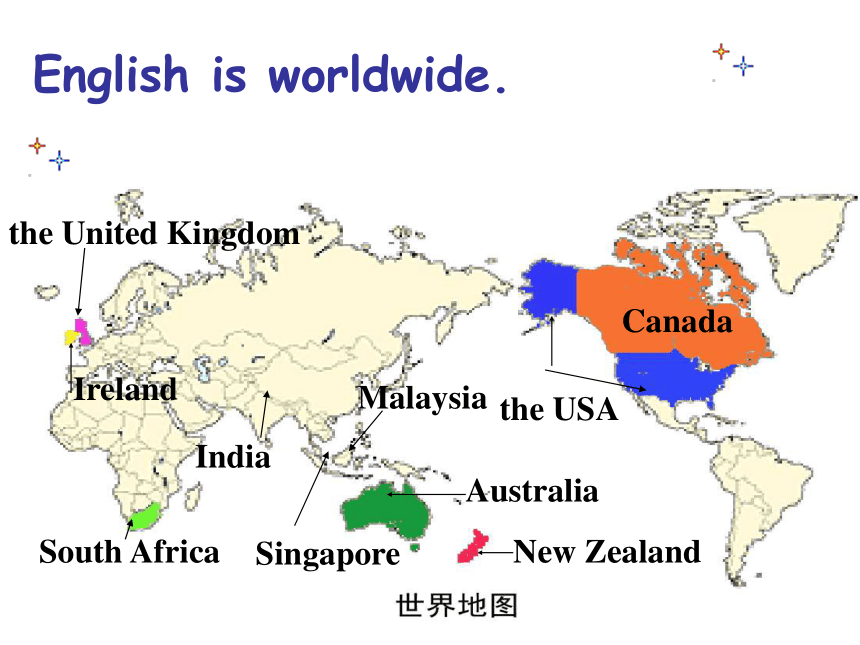
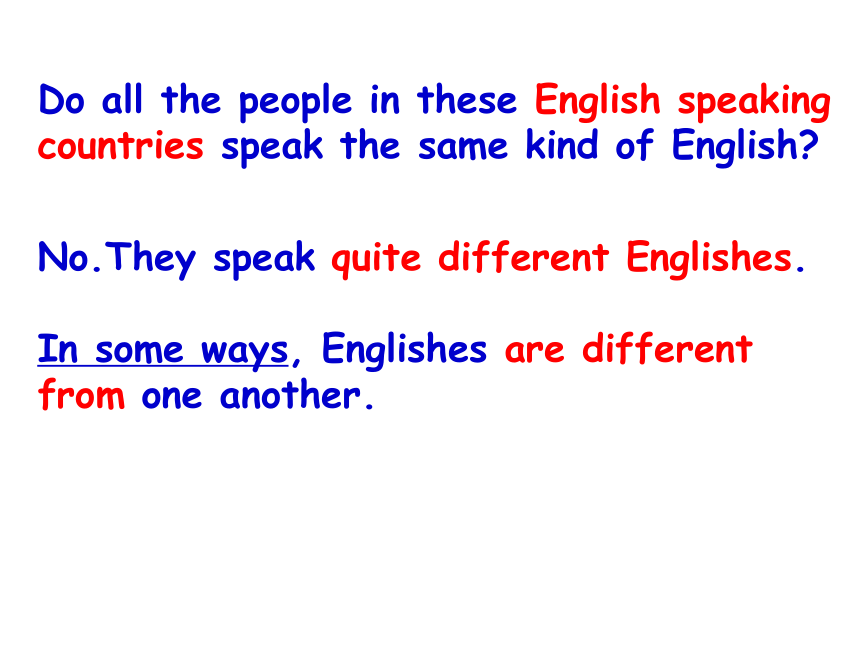
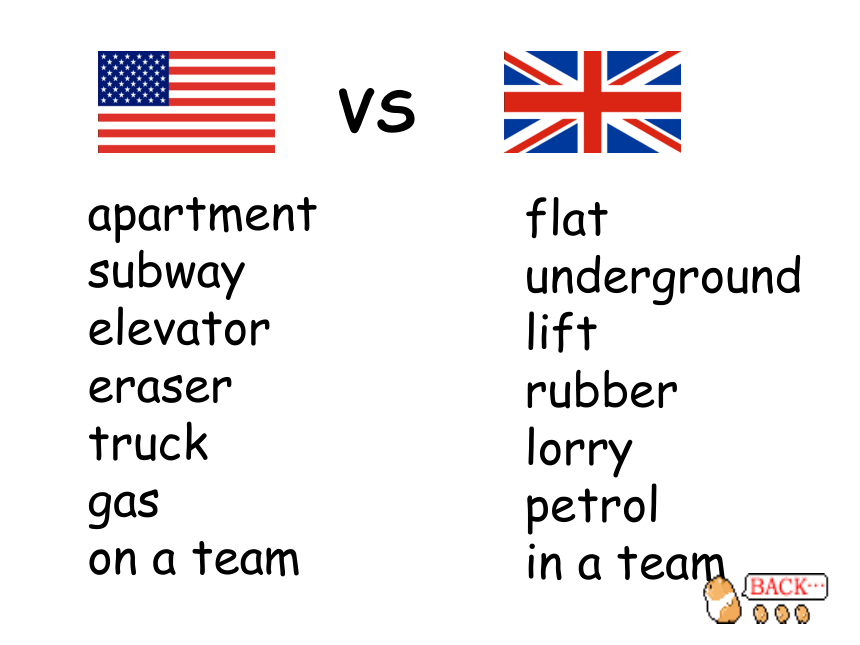
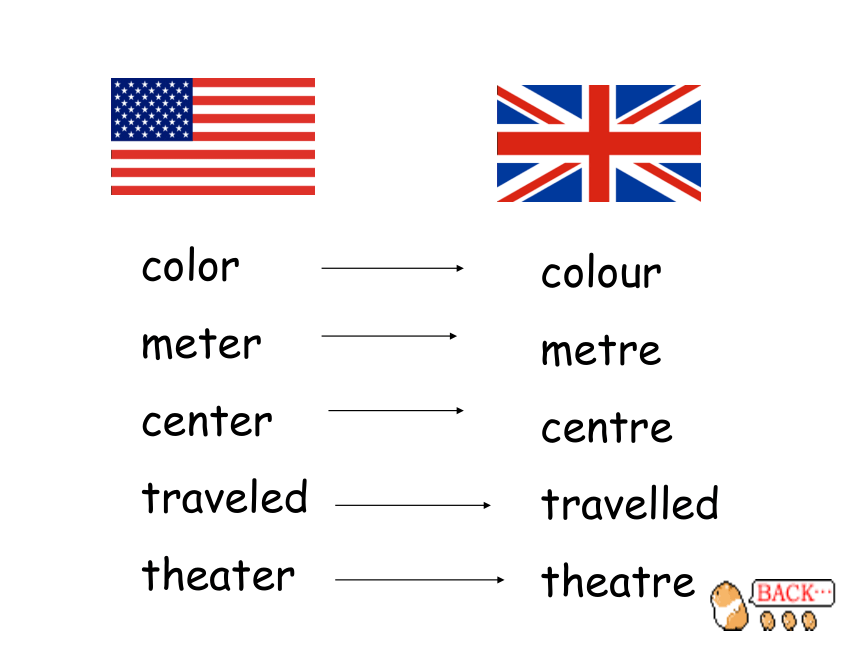
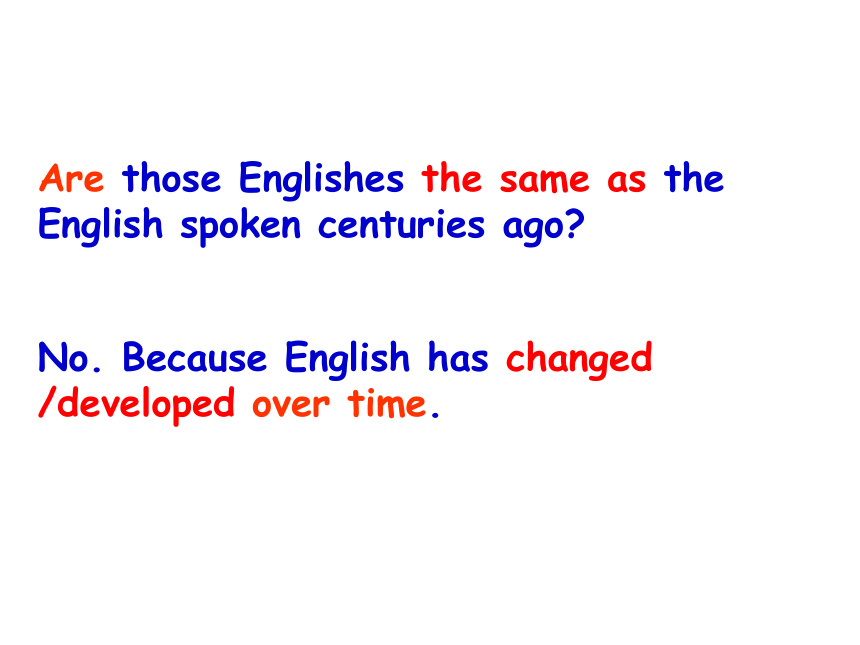
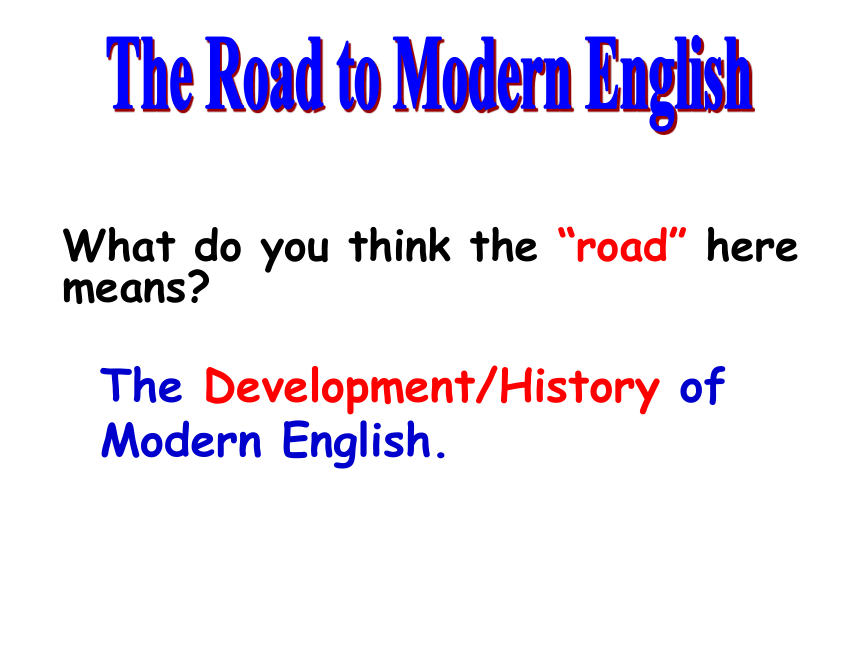
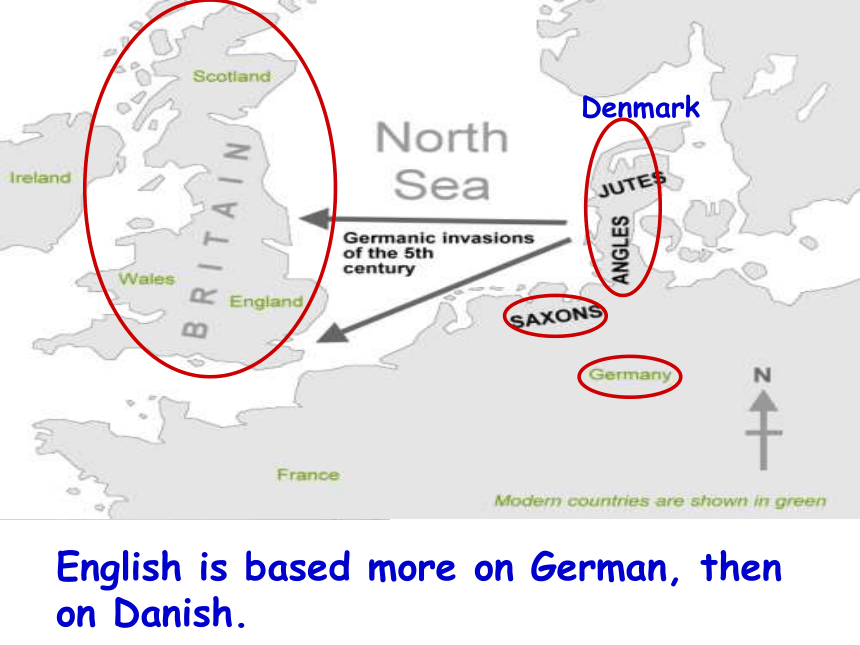
文档简介
课件69张PPT。English Around the World
Warming upWhy do you learn English?
I learn English in order to/so as to…Why should I learn
English?To use for businessTo communicate with foreigners To talk to
native speakersTo read English
booksTo write to pen friends in foreign countries.To enjoy some English music and moviesI learn English in order to pass the exam.Do you know any English speaking countries?the United Kingdom
the United States
Canada
Australia
South Africa
Ireland
New Zealand
India
Singapore
Malaysia Use English as an official language.English is worldwide.the USACanadaNew ZealandAustraliaSouth Africathe United KingdomIreland IndiaSingaporeMalaysiaDo all the people in these English speaking countries speak the same kind of English?No.They speak quite different Englishes.
In some ways, Englishes are different from one another.
apartment
subway
elevator
eraser
truck
gas
on a teamflat
underground
lift
rubber
lorry
petrol
in a team
VScolor
meter
center
traveled
theater
colour
metre
centre
travelled
theatreAre those Englishes the same as the English spoken centuries ago?No. Because English has changed /developed over time.The Road to Modern EnglishThe Development/History of Modern English.
What do you think the “road” here means?During the 5th century AD., three Germanic tribes (the Saxons撒克逊, the Angles盎格鲁and the Jutes朱特人) invaded入侵Britain.English is based more on German, then on Danish. DenmarkIn 1066 William the Conqueror征服者, the Duke公爵 of Normandy诺曼底 (part of modern France), invaded and conquered England. During that time, English is based on French.16201765-194718th CThe British moved to other parts of the world, so English began to be spoken in those countries.The development of EnglishDifferent kinds of EnglishEnglish changes over timeEnglish in south AsiaPart One:
Part Two:
Part Three:
Part Four:Para. 1 Para. 2Para. 3&4Para. 5Main idea for each partPara 1How many people spoke English at the end of the 16th century? Where did they live?2.Why did people in other countries
begin to speak English in the 17th
century?3.What is the result today?Para 1How many people spoke English at the end of the 16th century?
Where did they live?About five to seven million people spoke English at that time.
Nearly all of them lived in England.2.Why did people in other countries
begin to speak English in the 17th
century?Because People from England made voyages to conquer other parts of the world.3.What is the result today?Today, more people speak English as their first ,second or a foreign language than ever before.Para.2If native English speakers don’t speak the same kind of English, can they understand each other?Yes, they have no trouble in understanding each other.Para.31. Why has English changed over time?All languages change and develop when cultures meet and communicate with each other.It was based more on________.It is less like________,more like _______ and ______; (why)The new settlers enriched English especially the vocabulary. Why was the English spoken between about AD450 and 1150 was very different from the English spoken today?GermanGermanFrenchDanish What was Shakespeare able to do by the 1600’s?He was able to make use of a wider vocabulary than ever before.The language was________;
Changes in _______ happened.English began to be spoken in________.English is spoken in _____ and ________.English was spoken in AmericaSome British people was taken to _________.British settlers moved to _______.America AustraliasettledspellingIndiaAsiaAfricaSamuel JohnsonNoah WebsterGerman English Danish French enrichedEnglish has changed/developed over time.At first the English language was enriched by other languages.Later the English language spread to other parts of the world.America Australia India Asia spread to English doesn’t always keep the same but has ________ over time. During the 5th century AD, English was _____ more on German. Then gradually between about AD 800 and 1150, English became _____ like German because those who ruled England spoke _______ and _______. These new settlers ________ the English language and especially its __________. lessDanishFrenchenrichedvocabularychangedbasedIn 1620, some British settlers moved to ________. Later in the 18th century some British people were taken to __________. English began to be spoken in both countries. By the 19th century the language was ______. And Noah Webster’s dictionary gave a separate _______ to American English spelling. AmericaAustraliasettledidentityToday English is now spoken as a foreign or second language in South ______ and _______, such as ______, ___________, ________ and _____ _____. And the number of people learning English in China is increasing ________.AsiaAfricaIndiaSingaporeMalaysiaSouth AfricarapidlyTask 4: Making a speech I am the language of English. I have changed over time and I’m not what I used to be. During the 5th century , I was based more on ……Task 5: Group work——DiscussionWhy do you think people all over the world want to learn English?
Why do you think people in the world now want to learn Chinese? Today the number of people learning English/Chinese is increasing rapidly for various reasons. First, it is because …. Secondly, …Thirdly …Part1-
para1 At the end of 16th centuryAbout _________________ people spoke English. Nearly all of them lived_____________ .Later in the 17th centuryPeople from England____________to ________other parts of the world and __________that, English began to be spoken in many other countries.TodayMore people speak English _____ their first , second or a _____________five to seven millionin Englandmade voyagesconquerbecause ofasforeign language.Timeline of the development of EnglishWhy did English begin to be spoken in many other countries?
2.When did/do English have the largest number of people?Part1-
para1 Because people from England made voyages to conquer other parts of the world.Today
1. English speakers don’t speak the same kind of English, can they understand each other ?
Part 2-
para2Different kinds of English2. Can you make some dialogues using American English and British English?
And act it out.
American English: apartment subway eraser
British English: flat underground rubberPart 3-
Para3-4based more on German
influenced by Danish and then by French; vocabulary enrichedBritish settlers moved to America and English was spoken there.British people were taken to Australia and English was spoken there.language was settled;
two big changes in spelling happened.Changes of EnglishWho made great contribution to English in the 19th century?
2. What’s the name of the dictionary?
3. What’s the meaning of this dictionary?
Part 3-para4Samuel Johnson & Noah WebsterThe American Dictionary of the English LanguageIt gave a separate identity to American English spelling.Part 4-
para5What does people in South Asia use English as?
Why does India have a very large number of fluent English speakers?
3. Do you know what other countries speak English?
They use English as a foreign or second language.Because Britain ruled India from 1765 to 1947. During that time English became the language for government and education.Singapore, Malaysia, South Africa, China. Will Chinese become one of the world languages in the future?
Give your reasons.Thinking & Discussion voyage ??n. [C] a long journey, especially by ship: 航行;航海
He was a young sailor on his first sea voyage.Words and Expressionsbecause of: as a result of 因为,由于
Many beautiful fish are fast disappearing because of the severe pollution.
因为污染严重,许多美丽的鱼类正在面临绝种。
The police are advising motorists to reduce speed because of the fog.
由于有雾,警察告诫驾车者减慢速度。
We win the game because of his participation. 由于他的参与,我们赢了比赛。Words and Expressionsnative speaker n. [C] someone who has spoken a particular language since they were a baby, rather than having learnt it as a child or adult:讲母语的人 None of our teachers are native speakers of English. a native-speaker dictionaryWords and Expressionscome up: phrasal v.
1.to move towards sb. 走近
A young girl came up to me and asked for money.
2. to be mentioned or talked about in conversation:提出 What points came up at the meeting?
The teacher came up with a good plan for the summer vocation. Words and Expressions3. to happen, usually unexpectedly:发生 I‘ve got to go - something has just come up at home and I’m needed there. 4. be coming up to be happening soon:临近 My exams are coming up soon.
Words and Expressionsat present FORMAL now:目前
"Are you busy?" "Not at present."
At present she's working abroad.
I have no enough material in hand at present. 目前我手头没有足够的资料。 Words and Expressionsgradually ??adv. slowly over a period of time or a distance: 逐渐地
Gradually, she realized that he wasn't telling her the truth. The bank slopes gradually down to the river.Words and ExpressionsWords and Expressionsvocabulary ??n. 1 [C] all the words known and used by a particular person:词汇量
a wide/limited vocabulary By the age of two a child will have a vocabulary of about two hundred words.2 [C or U] all the words which exist in a particular language or subject:词汇
Every week our English teacher gives us a list of vocabulary (= words) to learn. Computing, like any subject, has its own vocabulary.make use of sth. to use sth. that is available:利用;使用
We might as well make use of the hotel's facilities.
She makes use of people she meets as raw material for her fiction.
她把她所遇见的人们作为她创作小说的素材。 Words and Expressionsthe latter (SECOND) n.[S] the second of two people, things or groups previously mentioned:后者 She offered me more money or a car and I chose the latter. Compare the former (FIRST).Words and Expressionsidentity ??n. [C or U] who a person is, or the qualities of a person or group which make them different from others:本身;本体;身份 The man's identity was being kept secret while he was helping police with enquiries.
I cannot reveal the identity of my source.
The informant(线人)was given a new identity (= a different name and new official documents) for protection.
I think my job gives me a sense of identity.Words and Expressionsfluent ??adj.流利的;流畅的 1 When a person is fluent, they can speak a language easily, well and quickly: She's fluent in French. 2 When a language is fluent, it is spoken easily and without many pauses: He speaks fluent Chinese. He's a fluent Russian speaker.
fluently ?adv.流利地;流畅地 I'd like to speak English fluently.Words and Expressionssuch as:for example 例如,诸如
That sum of money is to cover costs such as travel and accommodation.
I know many of them, such as John, Peter, and Tom.
The Roman languages such as French, Italian, are all derived from Latin.
拉丁语系, 例如法语, 意大利语, 都起源于拉丁语。Words and Expressionsfor example,such as,like 的区别
for example意思是 举个例子来说,... 一般只举同类人或物中的“一个”为例,作插入语,用逗号隔开,可置于句首、句中、句末;
such as意思是 比如…,后面不加逗号,直接列举同类人或物中的几个例子,不能穷尽,可和and so on连用;
like表示列举,可和such as互换。 Noise,for example,is a kind of pollution.
举例说明,噪音就是一种污染。 China has many big cities,such as Beijing,Shanghai,Shenzhen and so on.=China has many such big cities like Beijing,Shanghai, Shenzhen and so on.中国有许多大城市,比如北京、上海、深圳等等。
Language is part of culture.
Different countries have different cultures.
The same language may be different in different countries.Culture(文化) More than ten house are burnt down in the big fire.
The fire destroyed more than 700 homes and took 16 lives.
more thanmore than 用于数词前为“超过,多于”. He is more than my teacher. He is also my friend.
Bamboo can be used for more than building.more than 与其他词连用是为”不仅仅,极其“. My opinion is different from yours.
City life is different from country life.be different from与…不相同1.give 2.mean
3. grow 4.make
5. hang 6. lose
7.ring 8.ride
9. say 10.see
11.set 12. have
13. hide 14. shall
15. run 16. let
17. lie 18. pay
19.lend 20.mistake
Fun Time
1. Little girl: Hi, I’d like some sweets, please.
Store owner: No problem. All the candy we sell is sweet.
Little girl: I see, so you sell sweet sweets.
2. British boy: Let’s take the lorry for a trip into the countryside.
American girl: Of course, I expect you to take me!
British boy : Oh, I’m sorry, Lori, I mean my truck.
3. British boy : What a lovely autumn day!
American girl : Yes, it’s a nice fall day, isn’t it?Do people speak the same kind of English?Five main kinds of English in the worldBritish English
American English
Canadian English
Australian English
Indian English
Differences in vocabulary
Differences in spelling
Differences in pronunciation
(发音)
English Around the World
Reading
the U.K. AustraliaCanada JapanJapaneseFranceFrench Find out the English-speaking countriesThe Republic of Kenya America
Culture differences make the language differences.Culturehistory1.Do English stay the same ?
2.Which country has the largest number of English learners in the world?Listen to the tape to have a fast reading and think over the following questions.What about China?
English is a foreign language in China.Is it an English speaking country?
Warming upWhy do you learn English?
I learn English in order to/so as to…Why should I learn
English?To use for businessTo communicate with foreigners To talk to
native speakersTo read English
booksTo write to pen friends in foreign countries.To enjoy some English music and moviesI learn English in order to pass the exam.Do you know any English speaking countries?the United Kingdom
the United States
Canada
Australia
South Africa
Ireland
New Zealand
India
Singapore
Malaysia Use English as an official language.English is worldwide.the USACanadaNew ZealandAustraliaSouth Africathe United KingdomIreland IndiaSingaporeMalaysiaDo all the people in these English speaking countries speak the same kind of English?No.They speak quite different Englishes.
In some ways, Englishes are different from one another.
apartment
subway
elevator
eraser
truck
gas
on a teamflat
underground
lift
rubber
lorry
petrol
in a team
VScolor
meter
center
traveled
theater
colour
metre
centre
travelled
theatreAre those Englishes the same as the English spoken centuries ago?No. Because English has changed /developed over time.The Road to Modern EnglishThe Development/History of Modern English.
What do you think the “road” here means?During the 5th century AD., three Germanic tribes (the Saxons撒克逊, the Angles盎格鲁and the Jutes朱特人) invaded入侵Britain.English is based more on German, then on Danish. DenmarkIn 1066 William the Conqueror征服者, the Duke公爵 of Normandy诺曼底 (part of modern France), invaded and conquered England. During that time, English is based on French.16201765-194718th CThe British moved to other parts of the world, so English began to be spoken in those countries.The development of EnglishDifferent kinds of EnglishEnglish changes over timeEnglish in south AsiaPart One:
Part Two:
Part Three:
Part Four:Para. 1 Para. 2Para. 3&4Para. 5Main idea for each partPara 1How many people spoke English at the end of the 16th century? Where did they live?2.Why did people in other countries
begin to speak English in the 17th
century?3.What is the result today?Para 1How many people spoke English at the end of the 16th century?
Where did they live?About five to seven million people spoke English at that time.
Nearly all of them lived in England.2.Why did people in other countries
begin to speak English in the 17th
century?Because People from England made voyages to conquer other parts of the world.3.What is the result today?Today, more people speak English as their first ,second or a foreign language than ever before.Para.2If native English speakers don’t speak the same kind of English, can they understand each other?Yes, they have no trouble in understanding each other.Para.31. Why has English changed over time?All languages change and develop when cultures meet and communicate with each other.It was based more on________.It is less like________,more like _______ and ______; (why)The new settlers enriched English especially the vocabulary. Why was the English spoken between about AD450 and 1150 was very different from the English spoken today?GermanGermanFrenchDanish What was Shakespeare able to do by the 1600’s?He was able to make use of a wider vocabulary than ever before.The language was________;
Changes in _______ happened.English began to be spoken in________.English is spoken in _____ and ________.English was spoken in AmericaSome British people was taken to _________.British settlers moved to _______.America AustraliasettledspellingIndiaAsiaAfricaSamuel JohnsonNoah WebsterGerman English Danish French enrichedEnglish has changed/developed over time.At first the English language was enriched by other languages.Later the English language spread to other parts of the world.America Australia India Asia spread to English doesn’t always keep the same but has ________ over time. During the 5th century AD, English was _____ more on German. Then gradually between about AD 800 and 1150, English became _____ like German because those who ruled England spoke _______ and _______. These new settlers ________ the English language and especially its __________. lessDanishFrenchenrichedvocabularychangedbasedIn 1620, some British settlers moved to ________. Later in the 18th century some British people were taken to __________. English began to be spoken in both countries. By the 19th century the language was ______. And Noah Webster’s dictionary gave a separate _______ to American English spelling. AmericaAustraliasettledidentityToday English is now spoken as a foreign or second language in South ______ and _______, such as ______, ___________, ________ and _____ _____. And the number of people learning English in China is increasing ________.AsiaAfricaIndiaSingaporeMalaysiaSouth AfricarapidlyTask 4: Making a speech I am the language of English. I have changed over time and I’m not what I used to be. During the 5th century , I was based more on ……Task 5: Group work——DiscussionWhy do you think people all over the world want to learn English?
Why do you think people in the world now want to learn Chinese? Today the number of people learning English/Chinese is increasing rapidly for various reasons. First, it is because …. Secondly, …Thirdly …Part1-
para1 At the end of 16th centuryAbout _________________ people spoke English. Nearly all of them lived_____________ .Later in the 17th centuryPeople from England____________to ________other parts of the world and __________that, English began to be spoken in many other countries.TodayMore people speak English _____ their first , second or a _____________five to seven millionin Englandmade voyagesconquerbecause ofasforeign language.Timeline of the development of EnglishWhy did English begin to be spoken in many other countries?
2.When did/do English have the largest number of people?Part1-
para1 Because people from England made voyages to conquer other parts of the world.Today
1. English speakers don’t speak the same kind of English, can they understand each other ?
Part 2-
para2Different kinds of English2. Can you make some dialogues using American English and British English?
And act it out.
American English: apartment subway eraser
British English: flat underground rubberPart 3-
Para3-4based more on German
influenced by Danish and then by French; vocabulary enrichedBritish settlers moved to America and English was spoken there.British people were taken to Australia and English was spoken there.language was settled;
two big changes in spelling happened.Changes of EnglishWho made great contribution to English in the 19th century?
2. What’s the name of the dictionary?
3. What’s the meaning of this dictionary?
Part 3-para4Samuel Johnson & Noah WebsterThe American Dictionary of the English LanguageIt gave a separate identity to American English spelling.Part 4-
para5What does people in South Asia use English as?
Why does India have a very large number of fluent English speakers?
3. Do you know what other countries speak English?
They use English as a foreign or second language.Because Britain ruled India from 1765 to 1947. During that time English became the language for government and education.Singapore, Malaysia, South Africa, China. Will Chinese become one of the world languages in the future?
Give your reasons.Thinking & Discussion voyage ??n. [C] a long journey, especially by ship: 航行;航海
He was a young sailor on his first sea voyage.Words and Expressionsbecause of: as a result of 因为,由于
Many beautiful fish are fast disappearing because of the severe pollution.
因为污染严重,许多美丽的鱼类正在面临绝种。
The police are advising motorists to reduce speed because of the fog.
由于有雾,警察告诫驾车者减慢速度。
We win the game because of his participation. 由于他的参与,我们赢了比赛。Words and Expressionsnative speaker n. [C] someone who has spoken a particular language since they were a baby, rather than having learnt it as a child or adult:讲母语的人 None of our teachers are native speakers of English. a native-speaker dictionaryWords and Expressionscome up: phrasal v.
1.to move towards sb. 走近
A young girl came up to me and asked for money.
2. to be mentioned or talked about in conversation:提出 What points came up at the meeting?
The teacher came up with a good plan for the summer vocation. Words and Expressions3. to happen, usually unexpectedly:发生 I‘ve got to go - something has just come up at home and I’m needed there. 4. be coming up to be happening soon:临近 My exams are coming up soon.
Words and Expressionsat present FORMAL now:目前
"Are you busy?" "Not at present."
At present she's working abroad.
I have no enough material in hand at present. 目前我手头没有足够的资料。 Words and Expressionsgradually ??adv. slowly over a period of time or a distance: 逐渐地
Gradually, she realized that he wasn't telling her the truth. The bank slopes gradually down to the river.Words and ExpressionsWords and Expressionsvocabulary ??n. 1 [C] all the words known and used by a particular person:词汇量
a wide/limited vocabulary By the age of two a child will have a vocabulary of about two hundred words.2 [C or U] all the words which exist in a particular language or subject:词汇
Every week our English teacher gives us a list of vocabulary (= words) to learn. Computing, like any subject, has its own vocabulary.make use of sth. to use sth. that is available:利用;使用
We might as well make use of the hotel's facilities.
She makes use of people she meets as raw material for her fiction.
她把她所遇见的人们作为她创作小说的素材。 Words and Expressionsthe latter (SECOND) n.[S] the second of two people, things or groups previously mentioned:后者 She offered me more money or a car and I chose the latter. Compare the former (FIRST).Words and Expressionsidentity ??n. [C or U] who a person is, or the qualities of a person or group which make them different from others:本身;本体;身份 The man's identity was being kept secret while he was helping police with enquiries.
I cannot reveal the identity of my source.
The informant(线人)was given a new identity (= a different name and new official documents) for protection.
I think my job gives me a sense of identity.Words and Expressionsfluent ??adj.流利的;流畅的 1 When a person is fluent, they can speak a language easily, well and quickly: She's fluent in French. 2 When a language is fluent, it is spoken easily and without many pauses: He speaks fluent Chinese. He's a fluent Russian speaker.
fluently ?adv.流利地;流畅地 I'd like to speak English fluently.Words and Expressionssuch as:for example 例如,诸如
That sum of money is to cover costs such as travel and accommodation.
I know many of them, such as John, Peter, and Tom.
The Roman languages such as French, Italian, are all derived from Latin.
拉丁语系, 例如法语, 意大利语, 都起源于拉丁语。Words and Expressionsfor example,such as,like 的区别
for example意思是 举个例子来说,... 一般只举同类人或物中的“一个”为例,作插入语,用逗号隔开,可置于句首、句中、句末;
such as意思是 比如…,后面不加逗号,直接列举同类人或物中的几个例子,不能穷尽,可和and so on连用;
like表示列举,可和such as互换。 Noise,for example,is a kind of pollution.
举例说明,噪音就是一种污染。 China has many big cities,such as Beijing,Shanghai,Shenzhen and so on.=China has many such big cities like Beijing,Shanghai, Shenzhen and so on.中国有许多大城市,比如北京、上海、深圳等等。
Language is part of culture.
Different countries have different cultures.
The same language may be different in different countries.Culture(文化) More than ten house are burnt down in the big fire.
The fire destroyed more than 700 homes and took 16 lives.
more thanmore than 用于数词前为“超过,多于”. He is more than my teacher. He is also my friend.
Bamboo can be used for more than building.more than 与其他词连用是为”不仅仅,极其“. My opinion is different from yours.
City life is different from country life.be different from与…不相同1.give 2.mean
3. grow 4.make
5. hang 6. lose
7.ring 8.ride
9. say 10.see
11.set 12. have
13. hide 14. shall
15. run 16. let
17. lie 18. pay
19.lend 20.mistake
Fun Time
1. Little girl: Hi, I’d like some sweets, please.
Store owner: No problem. All the candy we sell is sweet.
Little girl: I see, so you sell sweet sweets.
2. British boy: Let’s take the lorry for a trip into the countryside.
American girl: Of course, I expect you to take me!
British boy : Oh, I’m sorry, Lori, I mean my truck.
3. British boy : What a lovely autumn day!
American girl : Yes, it’s a nice fall day, isn’t it?Do people speak the same kind of English?Five main kinds of English in the worldBritish English
American English
Canadian English
Australian English
Indian English
Differences in vocabulary
Differences in spelling
Differences in pronunciation
(发音)
English Around the World
Reading
the U.K. AustraliaCanada JapanJapaneseFranceFrench Find out the English-speaking countriesThe Republic of Kenya America
Culture differences make the language differences.Culturehistory1.Do English stay the same ?
2.Which country has the largest number of English learners in the world?Listen to the tape to have a fast reading and think over the following questions.What about China?
English is a foreign language in China.Is it an English speaking country?
